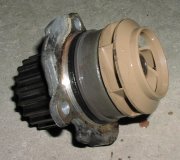|
Thu Jan 05, 2006
20:16
|
|
|
I know it's been a while since my last post, but that doesn't mean nothing's been happening!
I've got plenty of stuff to share, but this post is just for my most recent car-related
activity. I've known my A2 Golf needed a new head gasket for some time now, so I finally
got around to doing it. This past weekend was a good time for it, since I had Friday and Monday
off from work. Saturday I started to come down with some kind of bug - I felt pretty run down
and had a sore throat. I made it a lot worse by spending all day Sunday and all day Monday
out in the freezing cold New England winter tearing my car apart and putting it back together.
So what are the symptoms of a headgasket leak? Well, it can vary quite a bit. The main
components of an engine are the engine block and one or more cylinder heads. An in-line
engine will have one cylinder head, while most boxer and "V" engines have 2 cylinder heads. One
exception to that is Volkswagen's narrow angle V6 (VR6, as they call it) which has only one
cylinder head. The engine has passageways for circulating oil and coolant, and these passageways
run through both the cylinder head(s) and the block. The head gasket goes in between the block
and the cylinder head, and provides a seal to keep these oil and coolant passageways from leaking
into each other and into the combustion chambers. The gasket also keeps coolant and oil from
leaking outside of the engine. So depending on where the headgasket is leaking,
the symptoms could be oil and coolant mixing with each other (there will be oil blobs floating
in the coolant reservoir, and coolant sitting in the bottom of the oil pan), or coolant leaking
into the combustion chamber(s) and getting burned, or oil leaking into the combustion chamber(s)
and getting burned, or coolant and/or oil leaking to the outside, and running down the engine
block. In some cases, a headgasket failure can cause compression from one cylinder to leak
into a neighboring cylinder, which can really screw up the way the engine runs.

Here is the subject: 1991 Golf, 1800cc 8 valve, Digifant II.

Here's the dirty, old engine bay.

The easiest way to drain the coolant on this car is to disconnect the lower hose going to the
water pump. If you don't drain the coolant, you'll get a huge mess when removing the
cylinder head. I didn't drain the oil, because the level doesn't come up past the top of the
block.

Here the valve cover has been removed, and you can see the splash guard that sits directly
over the camshaft. That white stuff on the splash guard is a sign that there is a *lot*
of moisture getting mixed with the oil. This could indicate a bad head gasket.

Yikes! This is the under-side of the valve cover. Lots more of that white goop. It is
normal for some of this stuff to develop, especially if the car gets driven mostly for short
distances or if regular oil changes aren't performed. This much of it, however, is not
normal.

The "goop" has the consistency of warm peanut butter, and even though it looks nearly white
in these pictures it's actually a light brown (not quite as dark as peanut butter, but
close).

Here is a shot of the engine block all by itself in the car - the cylinder head has
been removed. This car has a Brospeed header installed, which turned out to make things
a little difficult. One of the pipes in the header just barely blocked one of the intake
manifold bolts from coming all the way out. Unfortunate, because the best way to get access
to the exhaust manifold/header nuts is to remove the intake manifold. In the end, I elected
to disconnect the header from the catalytic converter, and remove the cylinder head with
the header and the intake manifold still attached. It was very heavy that way, but it
worked out well.

Here's the grimy, old head gasket. Some of the coolant passageways were completely blocked
with crud.

This is the cylinder head, removed from the engine bay with the header and intake manifold
still attached. Lots of carbon buildup in those combustion chambers.

Here is the underside of the cylinder head again, after I spent a few minutes cleaning up
and blocking the surface that mates against the gasket. I used a good, heavy straight-edge
with some fine sand paper and diesel fuel to wet sand the surface (using the straight-edge
as a block for the sand paper).

Here is the gasket surface of the block after getting the same treatment. I also spent
some time cleaning some of the nasty carbon build-up from the tops of the pistons.

Hooray! The cylinder head is now back in place and bolted down. Some head bolts are
made to stretch when they are torqued down, so they cannot be re-used. Others are
not made to stretch, and can be safely re-used as long as they are not damaged.

Here's everything else installed - looks nearly the same as when we started! After refilling
the coolant system, I tried to start the car... and no luck. It just kept cranking. By this
time it was really late Monday night, and I was really feeling under the weather and I was
sick of being out in the cold. So I gave up for the night. I finally got a chance to look
at it again tonight, and it just turned out to be the valvetrain timing. Once that was corrected,
she fired right up.
Post your comments below. Please note that your comments will not be visible until
they have been approved by a moderator (me).
Date: 12/08/06, 04:02:28 PST
From: Robb Swan
Comments: I have done head gaskets several times in the A2 diesel and had always been curious about using copper headgaskets. Now im about to buy a 91 golf 1.8 8V and should I need to do the same with this car, I would like to know your thoughts on using the copper headgasket. The only things i have heard about them and I dont know it to be true for myself is that you can re-use them and they hold compression better but then again if you have warped-head issues then you open yourself up to al kinds of trouble. Any thoughts? thanks, Robb
Date: 01/01/07, 22:44:06 PST
From: Walter Kosciak
Comments: Go for it.
Thanks for the info.
I have a 89 diesel jetta with a 92 engine and when the head gasket goes it will be replaced with copper.Also ask your vw parts store guy.I would never knowingly reinstall a warped head.Just don't make sense.
|
|
|
|
|
|
A1 parts for sale:
|
 Item:
Item: Intake air pre-heat hose (from exhaust manifold shroud to air box), for Scirocco 2 (1982+)
Condition: New
$12
|
|
|
|
A2 parts for sale:
|
 Item:
Item: GTI dual-round grille with inner lights, bulbs, and lower trim strip
Condition: Used, lower trim strip is weathered.
$35
 Item:
Item: Parcel shelf strap, 3 available
Condition: New
$3.50 ea.
 Item:
Item: 8 (eight) valve guides, German, standard size, for 8 valve head
Condition: New
$24
 Item:
Item: Wheel cylinder (for rear drums, obviously), 2 available.
Condition: New
$12 ea.
|
|
|
|
A3 parts for sale:
|
 Item:
Item: Parcel shelf strap, 3 available
Condition: New
$3.50 ea.
|
|
|
|
A4 parts for sale:
|
 Item:
Item: OEM Water pump, ALH engines
Condition: Used, 130,000 miles
$20
|
|
|
|

